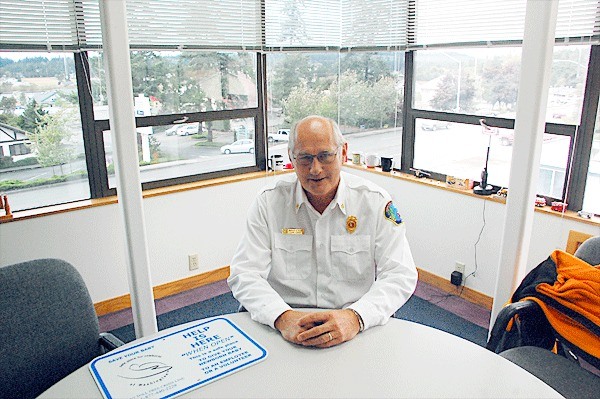North Whidbey Fire and Rescue is looking at its 2012 budget and included are plans to replace at least one old station with a new $1 million facility.
Although some numbers are not yet firm, district Fire Chief Marv Koorn is proposing an operating budget of $1.43 million. It’s about $24,000 more than the 2011 operating budget of $1.41 million.
A public hearing on the budget is scheduled for the next board of commissioner’s meeting, Oct. 11. The meeting begins at 7 p.m. and will be held in the basement level of the district’s new headquarters at 770 NE Midway Blvd.
According to Koorn, the largest expenses of the year will be the long-planned replacement of Station 51 at Cornet Bay. Built in 1962, the facility contains four bays, a bathroom and kitchen area and is the oldest of the district’s active stations.
Koorn said the plan is to tear it down and replace the old building with a new 3,800-square-foot, two-bay structure with two bathrooms and two offices. Total cost of construction is estimated at about $1 million.
Plans are in place for another building on Van Dam Road, which would take the place of two older stations, the one on Zylstra Road and the now closed San de Fuca Station. However, whether the project will make it off the drawing board next year is unknown.
“It’s a huge maybe, huge; probably not in 2012,” Koorn said.
Both stations would be funded with money the district squirreled away for capital projects between 2003 and 2010. It amassed about $3.75 million but only about $1.73 million is left following the district’s purchase of its new administrative building this past May.
The board had been looking at constructing a new headquarters on Heller Road as the district’s seven-person administrative staff had long outgrown its then-office space. About $400,000 had been invested into design and city fees when the board decided to abandon the plan and buy the three-story Chicago Title building for $1.55 million.
Not all the commissioners were in favor of buying the existing building, however. Commissioners Jerry Goen and Bruce Carman cast “yes” votes while TJ Lamont voted against the purchase largely because he felt it didn’t cater to firefighters’ needs, as it lacked training facilities or a place to park fire engines.
Koorn said he feels the building is working out well and is proving to be a sound financial decision. Not only did it cost about $750,000 less than the planned new building but it’s providing the district with a little extra cash as well.
The middle floor is being rented by Chicago Title and the rental income is expected to total more than $40,000 a year. Electricity and utility costs are up, but the revenue is far greater than the expenditure, he said.
Koorn did acknowledge the building’s lack of training facilities. Plans are in the works to build a three-story burn training tower, roughly 16 feet by 16 feet, at an undecided location sometime next year. The cost of the facility is estimated at about $25,000.
The district is also looking at buying land for a new station that would replace those at Silver Lake and Polnell Shores, the latter of which was remodeled in 2002. Koorn has budgeted $150,000 for the land purchase.
The district’s plan to replace and reduce the number of active stations is due to the age of some and changes in department volunteers. While numbers are historically consistent, the older stations used to be manned by volunteers from the area where they are located. That’s no longer the case and combining stations is a means of efficiency and cutting costs.
Also proposed is a handful of miscellaneous equipment purchases, which will total about $120,000. They include replacing hose nozzles on fire trucks, many of which have been in service since the 1960s, buying new blades for Jaws of Life units and making improvements to radio towers used for district communications.
Built into the proposed budget is additional revenue that would come from a 1 percent tax increase‚ about $14,000‚ along with a salary increase for employees of 2.7 percent, the current amount suggested under the consumer price index, Koorn said.
Employee expenses will rise considerably next year. Retirement contributions will more than double, from $24,000 to $51,500, while medical costs are set to increase 23 percent. Collectively, the district will pay $65,000 more than it will in 2011, Koorn said.
To cope with those and other additional expenses, the district has adopted some unorthodox revenue generators. Along with trying to get more money from the Washington State Parks and Recreation Commission for the services it provides at parks, the district is actively trying to recoup costs for its response to car accidents.
Of the two, the vehicle accident recovery is proving the more successful. By billing the insurance companies of those responsible for collisions, the district expects to collect at total of about $40,000 before the end of the year.
Despite its success, the policy is somewhat controversial, being criticized as a form of double-dipping taxpayers. Other fire districts in the county have yet to adopt similar policies. For example, Central Whidbey Fire and Rescue Chief Ed Hartin said his board made it clear he should not spend time investigating the matter.
Koorn said adopting the policy was a little “gusty” but that its caused less of a stir than he anticipated. And while neighboring fire districts have shied away from adopting the same policy, it’s clear success as a revenue generator has attracted the attention of many others.
“I get calls from districts all over the state asking about it,” Koorn said.



